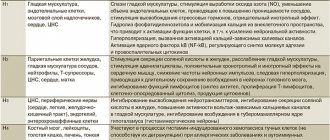A sedentary lifestyle, taking certain medications, stress, or hemorrhoids can cause difficulty bowel movements. Due to the immaturity of the gastrointestinal tract, young children, as well as when switching to artificial feeding or introducing complementary foods into the diet, may also experience problems with stool.
Treatment of chronic disorders involves taking medications. As an emergency measure, suppositories with glycerin for constipation will come to the rescue.
The mechanism of action of suppositories with glycerin
The medication belongs to the group of laxatives with dehydrating and dermatoprotective effects.
The therapeutic effect occurs due to the action of the active component - glycerin, which softens fecal stones and facilitates their movement through the large intestine.
The substance irritates the mucous membrane, thereby activating intestinal motility.
After insertion into the rectum, glycerin suppositories quickly melt, so the laxative effect of their use occurs in 15-30 minutes or earlier, depending on the condition and personal characteristics of the body.
Constipation symptoms
Atonic constipation and spastic constipation can be distinguished from each other by different symptoms.
With atonic constipation, the patient complains of:
- feeling of fullness in the stomach;
- feeling of bloating;
- painful pain;
- At first the stool is hard and well formed, but towards the end it becomes less formed and more liquid;
- pain during the process;
- Copious bowel movements causing cracks;
- There is blood on the toilet paper.
Spastic constipation can be identified by the following symptoms:
- a small amount of droppings similar to the waste products of goats or sheep;
- no discomfort during bowel movements;
- There is no blood on the paper or in the stool.
In what cases will glycerin suppositories help?
The instructions for glycerin suppositories contain a list of conditions for which they are prescribed. The main indication is difficult defecation or its absolute absence, caused by functional disorders of the gastrointestinal tract, old age/childhood, and psychological problems.
For preventive purposes, suppositories are prescribed to patients after surgical interventions and for pathologies that require the elimination of physical stress.
Including:
- anorectal abscess;
- anal fissures;
- hemorrhoids complicated by blood clots and pain;
- narrowing of the rectal lumen;
- suffered myocardial infarction.
Suppositories with glycerin can be used in preparation for rectal surgery, to prevent constipation after surgery, to avoid constipation after childbirth, and also before examining the rectum with instruments or x-rays.
Features of drug treatment of constipation in older people
Many people do not attach serious importance to the problem of difficult bowel movements and ignore it. This is the wrong decision. To choose medications that are effective in a particular case, you should consult a doctor so that he can diagnose and determine the cause of constipation, based on which a course of treatment will be prescribed. In addition to taking medications, therapy always includes adjustments to the lifestyle and nutrition of an elderly person. In some cases, doctors recommend physiotherapeutic procedures.
Up to contents
Contraindications for use, side effects
Glycerin suppositories for constipation are prohibited for use when:
- personal intolerance or hypersensitivity to glycerin or additional substances;
- diarrhea;
- irritable bowel syndrome;
- abdominal pain of unknown origin;
- intestinal obstruction;
- hemorrhoids in the acute phase;
- tumors, polyps and fissures in the rectum;
- inflammatory processes in the rectum (proctitis);
- acute inflammation of the appendix;
- bleeding in the rectum;
- pregnancy.
Under the supervision of a physician, they can be used for renal failure and during breastfeeding.
The use of suppositories with glycerin can cause:
- manifestations of allergies;
- discomfort in the anus (burning, itching);
- with frequent and prolonged use, the physiological process of bowel movement may weaken;
- in case of overdose – symptoms of irritable bowel (frequent loose stools).
How long does it take for constipation suppositories to work?
The effect of using suppositories for constipation develops at different times. This depends on the effect the active component has on the body, as well as on the composition of the suppository:
- After 5-10 minutes, Glycerin suppositories, RectActiv, Microlax begin to act. They should be used in a place where immediate defecation is possible.
- After 30 minutes, the effect of using Guttalax Express and Dulcolax suppositories develops.
- After 15-60 minutes, Bisacodyl suppositories begin to work.
Is it possible for pregnant women and children
The drug is contraindicated for women during pregnancy due to the risk of stimulating the uterus and provoking miscarriage or premature birth.
During lactation, it is allowed as prescribed by a doctor and when assessing the possible risks for the child, since no studies have been conducted on the penetration of glycerol into breast milk.
Children from birth to three years old, with the consent of the pediatrician, are allowed to administer ½ suppository for children once a day. At the age of 3-7 years, a suppository for children in full can be administered once.
Children starting from school age are prescribed suppositories for adults.
Elderly age
In old age, it is also common to experience mild discomfort.
The reasons are more frequent hypodynamia, lack of proper nutrition, long-term use of any medications, age-related problems, chronic diseases of the digestive tract, low sensitivity of the digestive system, etc.
Therefore, Bisacodyl suppositories and glycerin suppositories are the best.
How to use glycerin suppositories
The product is used rectally. After inserting the suppository into the rectum, it is advisable to lie down for at least 10 minutes so that the melted suppository does not leak out.
Application schemes:
- adult patients and children over 7 years old - one suppository with a dosage of 2.11 g once every 24 hours;
- children 3-7 years old - one suppository with a dosage of 1.24 g no more than once a day;
- children under 3 years old – half a candle with a dosage of 1.24 g once.
If these doses are ineffective, they can be doubled.
Types of constipation
Constipation is often accompanied by pain. They are felt during tremors, when gaining weight, after defecation. The pain can even twist in the shoulder blade, lumbar and umbilical regions, and abdomen.
The following varieties exist:
- Chronic. Difficulty defecating, hard stools, defecation does not occur completely. It is considered a functional disorder, accompanied by a feeling of heaviness in the epigastrium, dry stools, and flatulence. The cause of the pathology is an incorrect lifestyle and diet.
- Spastic. Symptoms include excessive flatulence, severe pain, and flatulence. Accompanied by intestinal spasms. After a long period of time, the stool comes out in the form of hard small lumps. Caused by contraction of the anal sphincter.
- Spicy. It seems clear, easily detected by instrumental methods. Causes: intestinal colic, peritonitis, intestinal diverticulum, cholelithiasis.
- Atonic. It appears when the smooth muscles of the intestines relax. It is typical for patients who move little or eat a lot of high-calorie foods.
- Psychological. It is characterized by the fact that this function can be controlled by a person. Caused by severe stress, depression, nervous breakdowns, mental illness. It often occurs in people who often have a changing work schedule and often travel on business trips.
special instructions
The drug is not recommended for regular use. The use of suppositories is stopped as soon as normal intestinal motility is restored. Before insertion, do not lubricate the anus or suppository with mineral oils, both solid and liquid.
For chronic hemorrhoids outside the acute phase, the medication is indicated for constipation lasting from two to three days. In the acute period, when there is bleeding and inflammation, the use of glycerin suppositories is prohibited.
After complicated childbirth, accompanied by the application of any types of sutures, in order to avoid violating their integrity when straining, suppositories are used in the absence of stool for a long time or for prevention, only after consultation with a doctor.
Causes of constipation
For all people, including children and the elderly, the causes of constipation are the same:
- Physical inactivity. Modern man moves very little and spends a lot of time sitting. It is more common in older people and office workers.
Consequently, bowel function slows down and stool stagnates inside. Going to the toilet becomes problematic. - Inadequate nutrition. Constipation is caused by a large number of fatty, fast foods, sweets and starchy foods. Quick snacks and inconsistent food consumption are also harmful.
- Neurogenic factors. Due to prolonged stress, conflicts and poor sleep patterns, the autonomic nervous system stops working properly. This is followed by disruption in the functioning of all organs, including the intestines.
- Intestinal motility disorders. For some reason his muscles cannot function normally. As a result, bowel movements become very difficult.
- The volume of stool is too large, disproportionate to the size of the colon. This is typical for an irrational diet. It is typical when a person eats rarely, but eats a lot.
- Weak urge to defecate. This happens rarely. The cause should be sought in cooperation with a medical specialist.
- Masses in the intestines may not move properly due to changes in the structure of nearby organs. For example, during pregnancy the uterus increases significantly in volume. Therefore, many pregnant women suffer from intestinal discomfort.
Possible consequences of long-term use of candles
Candles should not be used for a long time, as there are some negative consequences:
- diarrhea;
- severe diarrhea;
- low blood pressure;
- muscle weakness;
- contractions;
- burning sensation near the injection site;
- drug addiction and the inability to defecate without using them.
Of course, these consequences are possible, but not required. However, suppositories are considered a safe and cheap way to relieve constipation. Today the choice of these drugs is huge, so everyone will find a suitable remedy.
Preventing constipation at home
To prevent this, follow these steps:
- You should eat at least three to four times a day, and the intervals between meals should not exceed five hours.
- You should eat food two hours before bedtime.
- You can drink kefir before bed.
- Snacks in the form of dried fruits are allowed to improve intestinal motility: apricots, plums.
- There are foods that have a relaxing effect and contain a large amount of dietary fiber: vegetables, fruits, legumes, nuts, bran, dairy products.
- There should be less puree and all puree-like dishes (cream soups). You should also limit easily digestible cereals (crushed cereal, semolina), strong black tea, red wine, cocoa and all products containing it, pomegranate, persimmon, blueberries. They contribute to the formation of obstruction.
- Eat less flour and be careful with meat.
Drink 1.5 to 2 liters of fluid per day, unless there are contraindications. It is better to drink compotes and mousses without sweeteners than just boiled water, soda or black tea.- It is necessary to lead an active lifestyle. There are also special exercises to prevent constipation.
- Less worry. Stress affects the body in such a way that the digestive tract may deteriorate and constipation may occur. Therefore, it is important to learn not to worry or be nervous.
- Follow a bowel movement routine.









